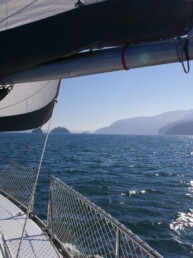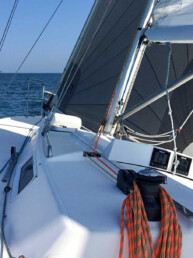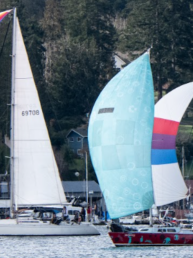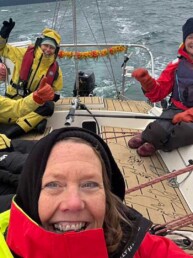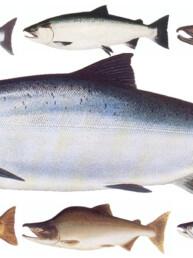Yep. It happened to me on the last night of my 22-day circumnavigation of Vancouver Island and Haida Gwaii. My confidence was high. I had just sailed with two-time solo circumnavigator, Mark Schrader (I’ll call him Schrader in this story), sailing journalist Herb McCormick, and my husband Mark Dalton (Mark D, for clarity). We had experienced all kinds of conditions and dealt with gale-force winds for three-and-a-half days 25 miles off the shores of Haida Gwaii (a story I shared in the November 2023 edition of 48° North). I was feeling pretty darn badass to tell you the truth. The journey had been epic, with extraordinary memories of mystical places, mostly terrific weather, and incredible companionship.
On the final night of our voyage, we sailed down the Strait of Juan de Fuca wing-on-wing under a sky ablaze in gold as the sun set over the mighty Pacific behind our stern. It truly couldn’t have been more of an ideal last evening and a perfect end to our magical adventure. By the time we reached Race Rocks near Victoria, B.C.—notorious for currents, chop, and shoals—it was dark and conditions had changed. A cruise ship idled close to the rocks and we slowed down while we tried to determine what course it was on. I was watching it through binoculars looking for their running lights, but the ship was lit up like a floating version of the Las Vegas Strip, blinding me with the glare of white lights bouncing off the dark sea.
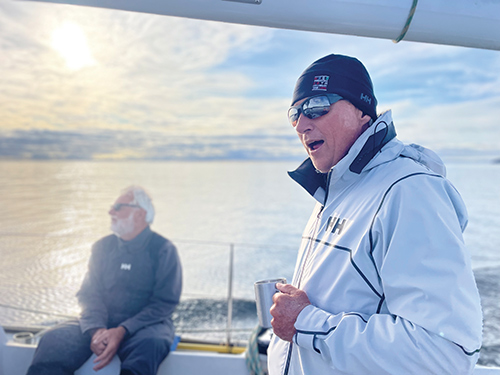
Schrader navigated Dancing Bear, his venerable Cal 40, to the north side of the Strait, which put us very close to the rocks. Waves whipped by tide and wind were slapping the hull from all directions and the cruise ship was so close we were now straining our necks to look up at the massive beast. What was it doing? Schrader said we were on a collision course and I continued to scour the ship’s many lights until I finally saw the twinkle of green, a starboard running light confirming the ship was moving away from us.
The wind was now over 20 knots and the seas had built to a four to five foot swell, which was hitting us beam-on. Four more ships soon exited Victoria Harbour, adding to the traffic and the array of nav lights to keep track of. Schrader, Mark D, and I worked together until we were out of the shipping lanes and well off of Race Rocks. At around one in the morning, after we had reset our heading, I told the boys to go to bed and that I’d do the first watch. It was my last night aboard Dancing Bear and I didn’t want to miss a thing.
They went below. Before Schrader went to bed, he told me not to jibe on my own. The conditions were too rough and he wanted to be there to help. I agreed. The first rule in being a good crew member is ‘don’t argue with the captain’—unless it’s about installing an anchor windlass after four anchoring attempts, but that’s another story.
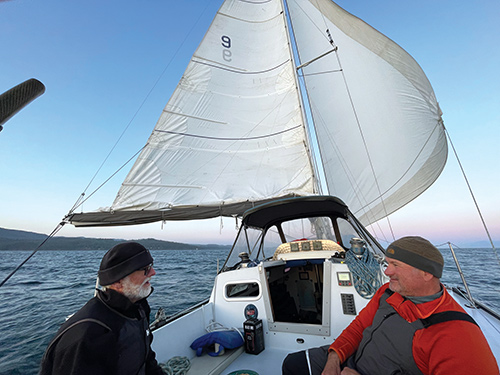
I was bundled in my foul weather gear, harnessed in, and ready to soak up every aspect of my extraordinary surroundings on this final night watch night. The waves still slapped sharply against Dancing Bear’s hull. The waning moon cascaded light on the black water, illuminating the path ahead. Nostalgic thoughts crept into my mind, but it wasn’t the time to reminisce or let my mind wander. I figured sailing was like driving—-the last five minutes from home are the most dangerous because of comfort and distraction. We were at least six hours from our home port of Anacortes, and I knew Herb would have told me to focus. So I did.
About an hour into my watch, in an instant, the direction of the wind and waves changed. I needed to jibe and fast. Yet before I could wake Schrader or even adjust our course, the main backwinded, the preventer block exploded, and the boom swung violently across. I quickly locked the main into the off-side preventer, and brought us back on course and under control.
This event would have thrown me off massively at the beginning of the trip. I was the newbie, inexperienced compared to the professional, world-renowned sailors I was with. I would have agonized about having accidentally jibed and felt terrible about the preventer block.
This is when I realized how much I had changed from the beginning of the trip. My confidence and skills had grown, and my crewmates had brought me in and made me feel like part of the team.
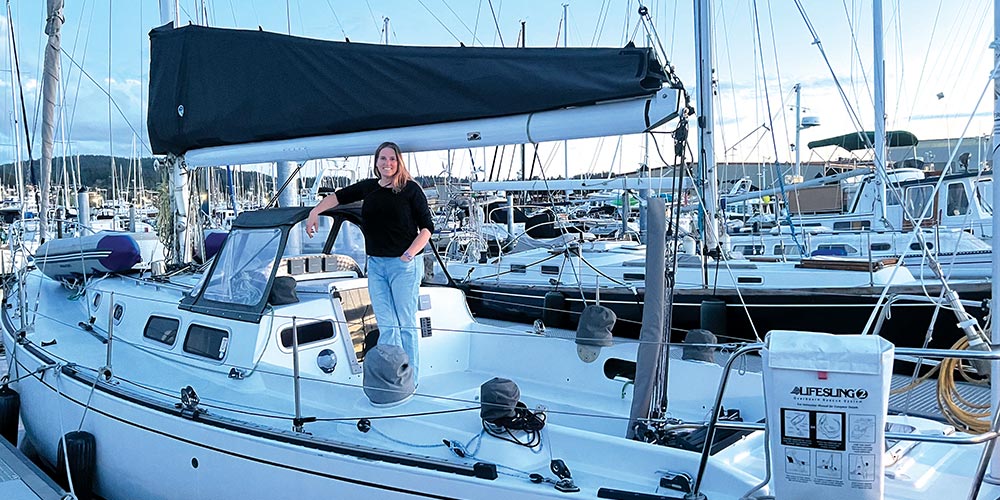
When I began this voyage to Haida Gwaii and around Vancouver Island, it had been a long couple of years of difficult losses and grief. My two brothers died a year apart from each other, and I was unable to visit because they lived in Canada and I was on the other side of a closed border in Washington. I had to work tremendously hard to lift myself out of the bottom of that barrel of darkness, and it compounded my real doubt and fears leading up to this trip. I said yes to this adventure to see if I liked sailing as much as I had thought—I had dreamed of open-water sailing since I was a teenager. Now a middle-aged woman with grown children, I was given the chance and it was exactly what I needed.
I quickly discovered that I didn’t just like sailing, I loved it. The connection with the elements for me was transcendent. I was incredibly grateful to have the quiet comfort of nature surrounding me. I loved living in small quarters, trying to figure out meals in unusual circumstances, and working daily with the winds and the tides. I was also filled with appreciation for my companions. They believed and encouraged me every day I was out there. With their total trust and confidence in me, I blossomed. I felt completely whole and at home on a boat on the ocean.
And so it was that when this accidental jibe came in the final hours of our journey, my confidence was strong in spite of it all. I knew that I should have jibed as soon as the wave sets had changed. My instincts were right, but I had barely enough time to react, let alone wake up Schrader.
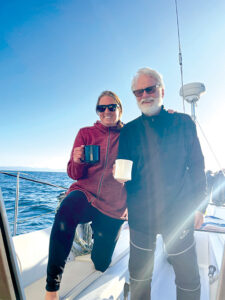
I collected the remnants of the preventer block, put them in my pocket, and continued my watch. At three o’clock in the morning, my husband came up to relieve me. He noticed immediately that we had jibed and then looked around with his headlamp and saw some pieces of the preventer block on the starboard deck. He was bewildered and said, “You blew up Schrader’s preventer block.”
Yes, I had. But I was tired, so instead of responding, I decided it was best if I went to bed.
Two hours later, I woke up and climbed into the cockpit. The sunrise shimmered pastel hues across the water of Rosario Straight. It was the home stretch. My husband was at the helm and I figured he had filled Schrader in, but it was time for me to face my skipper.
Schrader was up at the mast dropping the mainsail when he stopped what he was doing and sat beside me in the cockpit. His first instinct was to ask me if I was okay. I was relieved. I hugged him, dug into my pocket, and handed him the remnants of his preventer block. He held the pile of pieces in his hand and chuckled. He looked at it closely and saw that it was corroded. It had gone around the world with him, twice. He gave it back to me and said that I needed to keep it as a memento.
My near-month under sail taught me about going with the flow and to adapt with the conditions—something I had been working on for those hard two years. Stuff happens when you sail and stuff certainly happens in life, too, and circumstances can shift rapidly. Schrader would often offer advice, then quickly clarify and tell me to forget everything he just said because tomorrow would be different. There are some things you learn that will stick with you for life and, despite his wise caution, most of what he taught me is now deeply ingrained. In spite of my accidental jibe—possibly even partly because of it—I found my smile on this trip. And just as important, I rediscovered my passion for sailing.
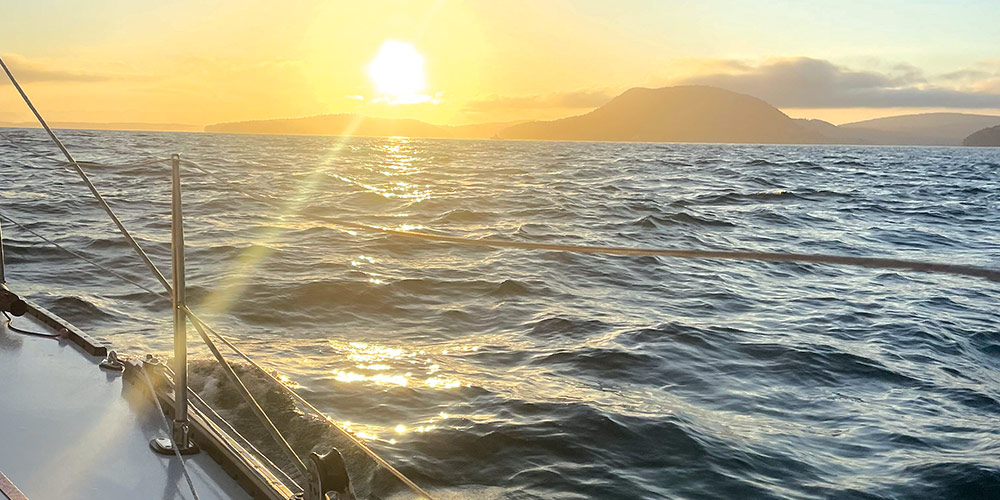
at the end of the group’s voyage.
Jennifer Dalton is the Project Director and crew for the Around the Americas sailing and research expedition departing in May 2025 to sail around North and South America. The expedition will conduct the first-ever pole-to-pole bull and giant kelp study and share findings through an open online education platform. www.oneislandoneocean.com

